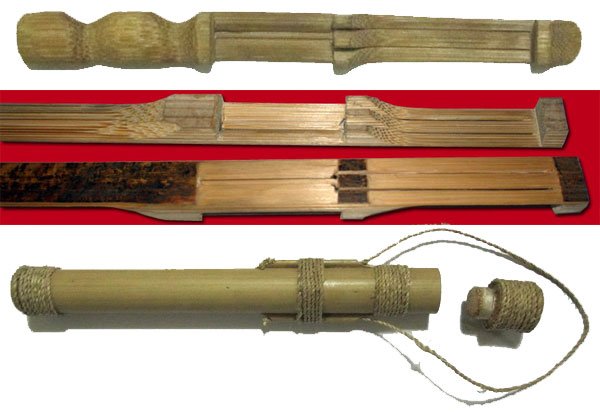
Karinding is a traditional Sundanese musical instrument made of kawung (palm tree trunks), and Awi (bamboo). A fairly old musical instrument supposedly a tool that has been used by karuhun (parents) since the days before the discovery of Kacapi, whose harp age itself has reached more than five hundred years ago. estimated this tool is older than 600 years and there are mention that this tool has been used since ancient times around the era of megalithic
Karinding itself is not only in tatar sunda, even in Bali, there is called Genggong, Tung kalo in Borneo which is basically karinding as well. And it turns out karinding not only exist in the reply and some areas in Indonesia, but in some other countries exist, but with different names and materials maker. Like juliab dali Tibet or xomits from Mongol.
Playing karinding
Karinding is played by putting it on the mouth and then being hit by the end or cast through the rope. The vibration between the karinding and the mouth combined with the air from the mouth produces an unusual sound. "Tweew..tweew ...". then more unique again, this karinding has a distinctive sound. If F yes F, D ya D. The standard size of the karinding is 10 cm long and 2 cm wide.
The development of karinding
Karinding as a pest repellent
In the past this tool was played. played at night by people while waiting for their fields in the forest or in the hills, and huddling between one hill and the other. It turns out karinding instrument not only as a means to drive out the night at night but also serves to repel pests. The sound produced by the musical instrument karinding make rice pests not approach because it is painful for the pest.
why Karinding able to produce a sound that can repel pests?
The resulting sound is a vibe that is not so obviously heard by the human ear, in sound science, the sound produced into the category of low decibel sound, this vibration can only be heard by insect type of animals, it is said that is now known as ultrasonic sound.
Karinding as a traditional musical instrument
At first because the sound of each karinding blown by ancient people had a unique sound. So when played simultaneously will form a music that is nice to hear. Especially when played with other traditional musical instruments such as angklung, kecapi and others. The sound produced by Karinding was magical, especially when heard lonely nights. Therefore in antiquity karinding often used for traditional ceremonies and rituals. And sometimes at the time of welcoming the king to come or marriage.
Greetings of peace steemian :)